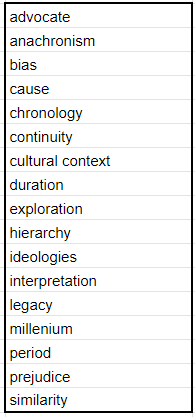
Primary History: Chronological Understanding
In celebration of The Queen's Platinum Jubilee we've added key vocabulary from Primary History: Chronological Understanding to our Vocab module. This year the Queen's Platinum Jubilee marks her 70th year on the throne. This module will help you learn the tools historians use to understand the past. Your learners can work on these 17 words now! View the list here

This list follows hot on the heels of last week's Primary History: Royalty KS1 vocabulary!
How the Vocab module works
The Vocab module is simple. It's online. Each learner has their own username and password. You (the teacher) allocate the word list you'd like your class to work on. And away they go!
Mastering words
The programme learns how well your learners understand a word. Once they've mastered it, it goes into their mastered list! Each word has a 'definiton card' that supports their learning. This includes a definiton, an example sentence, synonyms, antonyms and an image. As they become more confident with a word, the definition card becomes more challenging. The image disappears - then the synomyms and antonyms, and finally the example sentence. If the learner makes a mistake, then the scaffolding returns - until they've mastered the word!
Each word has audio support so they are hearing and seeing the word as they learn it. And you are bringing the words to life with your class as you read the book or cover the topic!
Interrupting the forgetting curve
One amazing thing about the Vocab module is that the programme actually revisits words at key intervals. This is based on the science of memory and the famous work of Ebbinghaus. The programme interrupts the tendency to forget new things by overlearning at strategic intervals! This helps the words become firmly lodged in your learners long-term memories!
Short and regular sessions are best!
As a supplementary resource, Vocab is best used alongside your usual classroom activities. You might ask your class to spend 5 or 10 minutes a few times a week, either at home or at school. Some teachers like to use the programme from the front of the classroom too!
Which word list next?
If you are reading an amazing book with your class and you'd like us to create a word list for it, then let us know!









